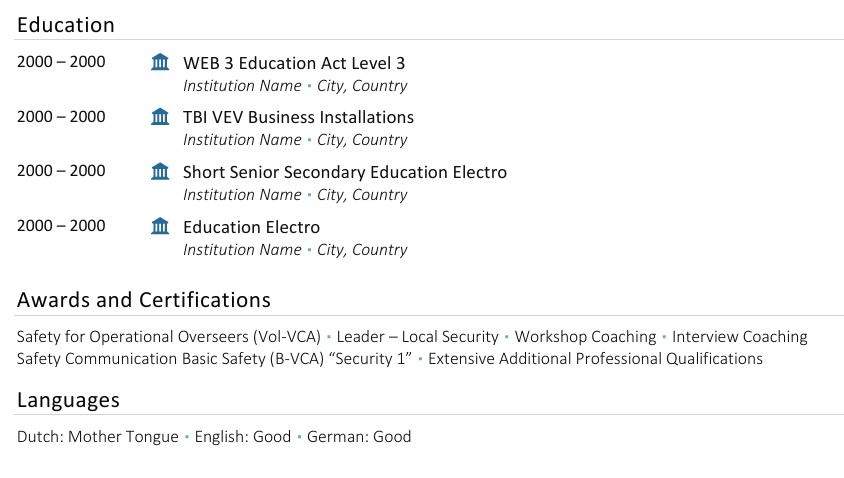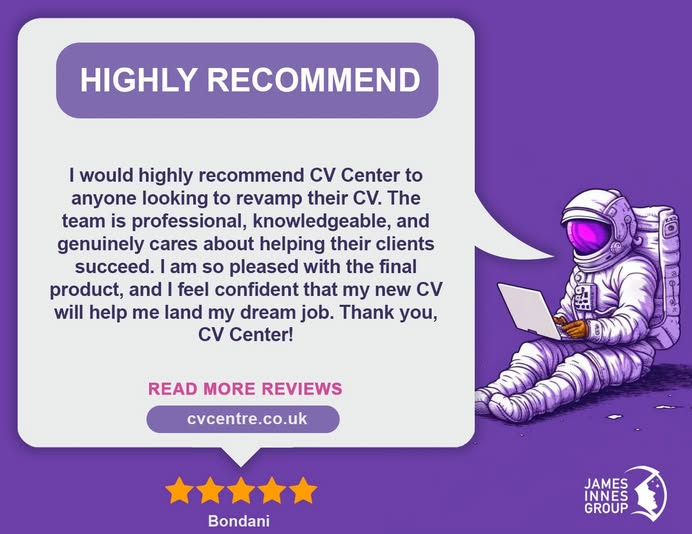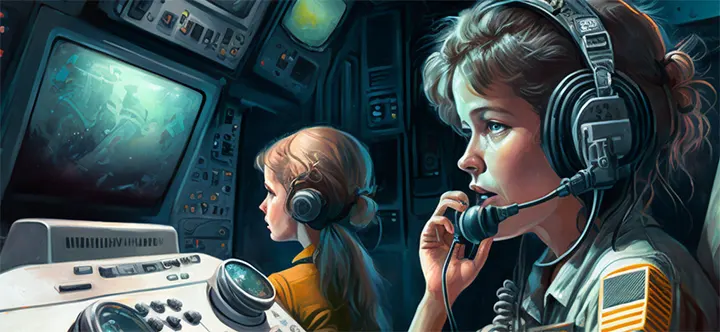How to End a CV Effectively: Expert Tips and Examples for a Strong Conclusion
What happens when you need to end a CV? Do you need to add anything at all? Should you mention references? Take a bow?
It’s not always clear what the “right” move is. But here’s the thing: finishing your CV with confidence matters more than you might think. It’s your final chance to reinforce your professionalism and leave the reader with a strong impression.
In this blog, I’ll walk you through exactly how to end your CV effectively, with simple tips, real examples, and none of the guesswork. Writing your CV just got easier!
Table of Contents
-
Why the End of Your CV Matters to A Hiring Manager
-
Elements to Include in Your CV Ending
-
Education and Qualifications
-
Relevant Interests or Hobbies
-
A Link to Your Online Presence
-
Certifications or Professional Memberships
-
Additional Experience
-
References
-
Expert Tips for a Memorable CV Ending
-
Examples of Effective CV Endings
-
Common Mistakes to Avoid When Ending Your CV
-
Final Thoughts
-
Frequently Asked Questions (FAQs)
Why the End of Your CV Matters to A Hiring Manager
Hiring managers want to see that you’ve thought carefully about what’s relevant to the role and included the information that really counts. So, whether your CV ends with a short final section on your interests or simply rounds off with your education, it’s important that it feels complete and intentional.
And remember, what’s relevant will vary depending on the job you’re applying for. So, tailoring your CV right to the very last line shows the employer that you’ve put real thought into how you present yourself.
For some roles, that might mean adding links to a professional portfolio or LinkedIn profile. For others, it could be worth highlighting industry memberships, volunteer work, or certifications. The key is to end on a note that reinforces your suitability, without padding it out for the sake of it.
Want guidance that’s specific to you? Get a free CV review and we’ll help you figure out exactly what to include - and what to leave out - to finish strong and land your dream job.

Elements to Include in Your CV Ending
The most common and standard way to end a CV is with your education and qualifications. It’s a clear, logical finish that works for most career stages. However, depending on your background, the role you’re applying for, or what else you want to showcase, there are other options you might want to include too.
Education and Qualifications
Your education can play a key role in strengthening your CV, particularly if you're early in your career, changing direction, or applying for a role that values professional qualifications.
It’s a good idea to briefly highlight any key qualifications in your professional profile (the short summary at the top of your CV). At the end of your CV, you can go into more detail and show how your education supports your goals.
Start with your most recent or most relevant qualification, with the rest listed in reverse chronological order. Include details such as the institution, grade (if strong), and any standout modules or projects. For example:
BA (Hons) Graphic Design, University of Leeds – First Class (2022)
Final project: Rebranding campaign for a local charity, featured in the Leeds Student Design Showcase
This involved working to a real client brief, applying strategy, design theory, and brand storytelling, enhancing my ability to deliver creative work with commercial impact.
If you're still studying, that’s absolutely fine. Just make it clear.
Level 3 Extended Diploma in Health and Social Care (In Progress)
Expected completion: December 2025
The course has given me hands-on understanding of safeguarding, communication, and care planning - helping me build a professional, compassionate approach to supporting others.
If you're early in your career or it's required for the role, you should also include your school grades.
A-Levels - English (A), Business (B), Psychology (B)
GCSEs - 9 GCSEs A*–C including English and Maths
However, if you don’t have traditional school grades or prefer to highlight other achievements, you can include alternative qualifications such as BTECs or NVQs, workplace training programmes and short-term courses or certifications.
The goal here isn’t just to show what you studied, it’s to show how your education has prepared you to add value from day one.
Relevant Interests or Hobbies
This one sits in the “use with purpose” category. Your hobbies don’t need to take centre stage, but if they say something meaningful about you, or tie into the role, they’re worth mentioning.
For instance, if you’re applying for a creative position and you run a photography blog, mention it. If you’re going into a people-focused role and you’ve been coaching a local football team, include it. It shows passion, initiative, and gives the employer a further sense of who you are.
A Link to Your Online Presence
If you have a professional online presence, include a hyperlink. For example:
With 91% of employers using social media to hire talent today, chances are they’ll be checking you out online - whether you include a link or not. So, if you’ve got a professional online presence that you’re proud of, why not point them towards it?
This could be your LinkedIn profile, a personal website, or an online portfolio, as long as:
- It’s relevant to the role
- It’s up to date
- It reflects you in the best possible light
Include the full URL (e.g. linkedin.com/in/yourname) and make sure it's a working hyperlink. And to encourage that all-important click, add a short line explaining what they'll find. For example:
www.linkedin.com/in/yourname – Includes project photos from recent architecture builds, client recommendations, and updates on current planning legislation.
Certifications or Professional Memberships
Any extra qualifications or memberships with industry bodies can be a real plus, especially in sectors where staying current is key (looking at you, tech and finance). Just make sure they’re still active and relevant - there’s no need to include that first aid badge from Scouts.
Additional Experience
Got something else up your sleeve? Things like publications, presentations, lectures, community service, or speaking engagements can absolutely belong in a final section, if they back up your credibility or demonstrate relevant skills.
Think of this section like bonus content. Optional, but great if it adds weight to your story.
References
If professional references are specifically requested on the job advertisement, include them at the bottom of your CV, underneath any of the other sections we've mentioned above (and do make sure your referees know they might be contacted).
If references aren’t requested, we recommend writing “References available on request” as your final line.

Expert Tips for a Memorable CV Ending
A strong CV ending doesn’t need to be dramatic, but it should be deliberate. Whether it’s a small addition or a simple sign-off, here’s how to make sure your ending lands well:
Tailor Your Ending to the Job Description
I know it’s tempting to reuse the same CV for every job, but trust me, a tailored finish really does make a difference. If the role places a lot of emphasis on creativity, briefly mentioning your passion for creative hobbies is worthwhile. Think about what matters most to this employer, and make sure your CV ends with something that reflects that.
Highlight Your Unique Value
Your CV should tell your story, and that includes the final lines. This could be as simple as linking to a project that shows your work in action. If you're not sure what makes you stand out, start by asking yourself: “What do I want this employer to remember about me?”
Check Your Formatting
Let’s make sure you don’t lose points on presentation at the last hurdle! Use consistent spacing, font sizes, and bullet points, just like the rest of your CV. Keep it clean, professional, and easy on the eyes.
Your CV should read smoothly from top to bottom. If you’re adding extras like references, online links, or hobbies, add clear headings like:
- Additional Information
- Professional Memberships
- Online Presence
- References
This keeps everything tidy and helps the reader find what they’re looking for, especially if they’re scanning quickly (which, let’s be honest, most are).
And don’t forget to ensure it's the correct document format. Save your CV in a widely accepted file type, usually PDF (unless the job ad specifically asks for something else). This ensures the end of your CV isn't cut off or formatted oddly.
Examples of Effective CV Endings
Let’s bring it to life with a few hypothetical examples. Meet Lisa, David and Amira, job hunters like yourself keen to finish their CVs with a bang.
Example 1: Corporate Professional
Lisa, a mid-level marketing executive with five years’ experience, is applying for a senior role in a fast-paced agency. Her CV already includes detailed achievements from her most recent roles, so she uses the ending to briefly touch on her earlier workplace experience without making the CV too long. She also links to her LinkedIn profile to give the employer the opportunity to find out more.
Early Career Roles
- Marketing Assistant – Greenlight Media (2017–2018)
- Sales & Promotions Intern – FastTrack Retail (2016)
- Social Media Volunteer – Local Arts Collective (2015)
Online Presence
www.linkedin.com/in/(name) – Includes examples of recent campaigns, client feedback, and regular posts on brand strategy trends.
Example 2: Career Change
David has worked in retail management for over a decade but is now transitioning into HR. He’s completing a CIPD course and wants to highlight how his experience and interests align with his new direction.
Education
CIPD Foundation Certificate in People Practice (In Progress)
Expected completion: December 2025
This qualification is building my knowledge in key areas such as employee engagement, recruitment and selection, HR data analysis, and organisational performance, all of which directly support my move into a people-focused role.
Additional Experience
Volunteered as a mentor for new starters in-store, delivering onboarding sessions and supporting team development - a role that sparked my passion for HR.
Interests
In my spare time, I enjoy listening to podcasts on psychology. I’m particularly interested in how language and mindset influence workplace relationships, something I aim to bring into my future HR role.
References available on request.
Example 3: Recent Graduate
Amira has just finished her degree in Biomedical Science and is applying for a laboratory assistant role. She doesn’t have a long work history, but she uses her CV ending to showcase her academic achievements and extra experience.
Education
BSc Biomedical Science, University of Leeds – First Class Honours
A-Levels: Biology (A), Chemistry (A), Maths (B)
Additional Experience
Volunteered at a health clinic, assisting with patient check-ins and record organization, enhancing attention to detail and admin skills.

Common Mistakes to Avoid When Ending Your CV
Even the best CVs can lose a bit of impact if they stumble at the finish line. Avoid these mistakes to make sure yours doesn't.
1. Including Irrelevant Information
It’s tempting to squeeze in "just one more thing," especially if you’re worried your CV feels too short. But padding out the final section with unrelated hobbies or an experience that doesn’t tie back to the role will only distract from your core message.
Pssst - this rule applies to your whole CV, not just the ending. Need a full walkthrough? Check out our guide on how to write a CV from start to finish.
2. Being Too Generic
A common mistake at the end of a CV is going vague. If the final part of your CV includes anything, make sure it adds something specific. For example, if the job values collaboration, mention the team project you helped lead. If it calls for attention to detail, highlight a real example where that skill made a difference.
3. Putting Important Information at the Bottom
This doesn’t mean the information at the bottom isn’t valuable. The key is knowing what belongs where. You don’t want to bury your most important selling points or contact details at the bottom. These should be right at the top, where hiring managers will see them straight away.
Final Thoughts
Whether you choose to include a final section or simply finish with a clear, confident close to your experience, the goal is the same: make it feel complete, relevant, and intentional.
Of course, I know that writing a CV (never mind ending one!) isn’t always straightforward, especially if you’re not sure what recruiters are really looking for, or how to present your experience in the best light.
Need Help With the Recruitment Process?
Why not start with a free CV review? It’s a quick, no-pressure way to get expert feedback on how your CV is landing and what you can do to make it stronger.
Here’s what you’ll get:
- A personalised review tailored to your career goals
- Honest, constructive feedback. No generic templates here!
- An expert eye on layout, structure, and how well your CV communicates your value
- Tips to ensure ATS compatibility (so your CV makes it past the bots and into human hands)
- Suggestions on how to make your soft skills, experience, and achievements stand out clearly and confidently
You don’t have to figure it out on your own - we’re here to help you every step of the way.

Frequently Asked Questions
Below, you can find answers to some of the most common questions on writing a professional CV.
What Should the Last Line of My CV Be?
The last line of your CV should be something relevant and professional that adds a final touch of value. This could be a link to your LinkedIn profile, a short note on your availability, or a final qualification or certification. If your work history or education naturally wraps things up, you can simply end with “References available on request," a neat and familiar way to close.
How Long Should the Ending of My CV Be?
The ending of your CV should be short and to the point. A few lines or bullet points are plenty - just enough to include any relevant extras like education, certifications, interests, or memberships.
Can I Add a Hobby to the End of My CV?
Yes, you can add a hobby to the end of your CV and in some cases, you absolutely should. Adding a relevant hobby can give employers a glimpse of your personality and show how you might fit into their team. Just make sure it supports your application. For example, coaching a youth team shows leadership, while writing a blog shows creativity and communication. Keep it relevant and skip anything too generic.
What’s the Best Way to Show Availability for an Interview?
It’s best to include your availability right at the top of your CV, ideally in your professional profile. That way, it’s one of the first things employers see.

